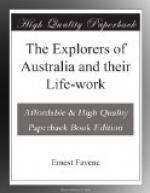Arthur Phillip, whose claim to be considered the first inland explorer of the south-eastern portion of Australia rests upon his discovery of the Hawkesbury River and a few short excursions to the northward of Port Jackson, had but scant leisure to spare from his official duties for extended geographical research. For all that, Phillip and a few of his officers were sufficiently imbued with the spirit of discovery to find opportunity to investigate a considerable area of country in the immediate neighbourhood of the settlement, and, considering the fact that all their explorations at the time had to be laboriously conducted on foot, they did their work well.
The first excursion undertaken by Phillip was on the 2nd of March, 1788, when he went to Broken Bay, whence, after a slight examination, he was forced to return by the inclemency of the weather. On the 15th of April he made another attempt to ascertain the character and features of the unknown land that he had taken possession of. Landing on the shore of the harbour, a short distance from the North Head, he started on a tour of examination, and, in the course of his march, penetrated to a distance of fifteen miles from the coast. At this point he caught sight of the distant range that was destined to baffle for many years the western progress of the early settlers. Phillip, on this his first glimpse of it, christened the northern elevations the Caermarthen Hills, and the southern elevations the Lansdowne; and a remarkable hill, destined to become a well-known early landmark, he called Richmond Hill. In the brief view he had of this range, there was suddenly born in Phillip’s mind the conviction that a large river must have its source therein, and that upon the banks of such a river, the soil would be found more arable than about the present settlement. He at once made up his mind to try and gain the range on a different course.
A week later he landed at the head of the harbour and directed his march straight inland, hoping to reach either the mountains, which he knew to be there, or the river in whose existence he firmly believed. Disappointment dogged his steps; on the first day a belt of dense scrub forced his party to return and when, on the morrow, they avoided the scrub by following up a small creek and got into more thinly timbered country, their slow progress enabled them to accomplish only thirty miles in five days. By that time, they were short of provisions; there was no river visible, and the range still looked on them from afar. What cheered them was the sight of some land that promised richly to reward the labour of cultivation.
It was not until the 6th of June, 1789, that Phillip resumed his labours in the field of exploration. The Sirius had then returned from the Cape of Good Hope, and he could reckon on the assistance of his friend, Captain Hunter, to re-investigate Broken Bay with the vessel’s boats. Accordingly, two boats were sent on to Broken Bay with provisions, where they were joined by the Governor and his party, who had marched overland. Besides Phillip, the party consisted of Captain Hunter and two of his officers, Captain Collins, Captain Johnston, and Surgeon White.




